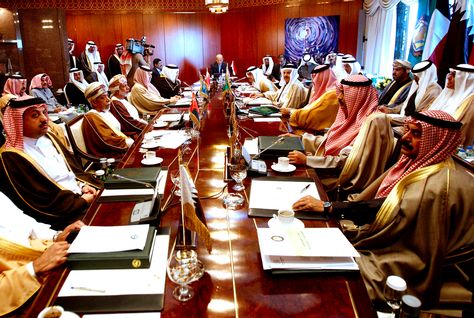
In response to Hezbollah’s deepening role in the Syrian civil war, the Gulf Cooperation Council (GCC) pledged in June to target Hezbollah loyalists and their financial and commercial interests in the Gulf. Presumably, the GCC action, which will overwhelmingly affect Hezbollah’s Lebanese Shia support base, aims to convince them that its behavior in Syria is harming their interests, thereby turning them against the party.
Several dozen Shia have been deported from Saudi Arabia and Qatar alone since the statement was made. Hundreds of thousands of Lebanese live and work in the Gulf, and many others in Lebanon depend on remittances from them. The GCC’s most effective tools against foreigners are therefore withholding work visas and residencies from those seeking work in the Gulf, or deporting expatriates. The monarchies also realize that targeting the Lebanese diaspora and remittances threatens Lebanon’s economy, and can ostensibly be used to pressure the Lebanese government to take action against Hezbollah.
The GCC’s actions fit a historical pattern of Sunni leaders’ suspicion towards Shia politics in general, particularly the Lebanese Shia, who have been targeted in the past for their alleged pro-Hezbollah sympathies. A spokesman for Lebanese Shia living in GCC countries claims the United Arab Emirates alone has expelled more than 400 Lebanese Shia families since 2009 for unspecified security reasons. Prominent Lebanese businessmen with extensive interests and employees in the GCC (and no sympathy for Hezbollah) report serious difficulty in obtaining work permits for Shia workers. Lebanese have been interrogated and turned away upon entry to Bahrain, following the outbreak of unrest among its own Shia population, whom the monarchy accuses of collaborating with Hezbollah and its patron Iran. All of this points to much more divisive posturing related to the Sunni-Shia divide and further poisons relations between the two communities. The impact is felt far beyond the individuals and families affected; these actions carry weight and a symbolic message that perpetuates a negative sectarian narrative.
The GCC’s policy is fraught with complication, ambiguity, and peril. Hezbollah is certainly popular among Lebanese Shia, of whom many live and work in the Gulf. It is unclear however whether they fit the monarchies’ criteria for supporting Hezbollah, or what constitutes ‘support’ exactly. Given foreigners’ near-total lack of rights, and the ruling families’ control of the judicial system in the GCC, governments need not bother explaining or justifying their actions against deportees. Anecdotal evidence indicates suspects are simply informed they are being deported, and are deprived of their passports until they leave the country.
The Gulf monarchies have little trouble attracting foreign workers. Buoyed by enormous wealth and their near-total dominance of politics, the ruling families are unlikely to exert tremendous efforts in sifting the material supporters of Hezbollah from those who express some sympathy (public or private) for the party. The Sunni rulers are deeply conscious of their military vulnerability to Iran and have a very low tolerance for political risks. Their most likely approach will be to deport Lebanese Shia with little discrimination, with the broad aim of alienating the Shia from Hezbollah.
Leaving aside the unfairness of collectively punishing Lebanese Shia for Hezbollah’s actions, the GCC policy is unlikely to yield the desired results for a number of reasons. Most obviously, it is likely to reinforce Hezbollah’s narrative of Shia victimization at the hands of Sunni oppressors. Whatever its merit, this story resonates deeply among many Hezbollah supporters, and Hezbollah itself uses it to rally support for the fight against the Sunni-led rebellion in Syria—a rebellion portrayed as a Sunni war against the Shia.
It is also difficult to see the GCC’s policy seriously affecting Hezbollah’s calculus. For one, both Hezbollah and its Shia constituency are far more dependent on funds from Iran and the Shia diaspora in Africa than on money from the GCC. Hezbollah already perceives the GCC as enemies, and so increasingly do the Lebanese Shia. Its commitment to the fight in Syria runs deep and is not premised on financial support from expatriates in the GCC. Hezbollah has already shown it is ready to alienate Lebanon’s Sunni population (not to mention the majority of Syrians) in pursuit of its strategic goals. Finally, any attempt to compel the Lebanese government to move against Hezbollah at this stage is futile; Hezbollah dominates several state institutions, and those outside its control are incapable of confronting it.
What is most striking is the contrast between Hezbollah and Iran’s larger vision and strategy in Syria and the GCC’s. Hezbollah arms, trains, indoctrinates, and supports its community in pursuit of a clear goal in the face of high casualties and political costs. It does so with clear and consistent military and financial support from Iran, which has shaped Hezbollah into the region’s most capable militia. Meanwhile, as Hezbollah fights, dies, and wins in Syria—and pushes GCC-supported Syrian rebels back—the Gulf states resort to blackmailing and expelling their own residents for essentially sectarian reasons. Nothing more clearly illustrates why the GCC strategy in Syria is failing while Hezbollah and Iran find success; the Gulf states are simply outclassed by their rivals.
To Hezbollah and Iran, and to their supporters in Lebanon, the GCC’s crude behavior only underscores the monarchies’ weakness in the face of military capability and ideological sophistication. It also highlights the GCC states’ over-reliance on financial and economic tools to shape complex political and military outcomes, due to a lack of patience, persistence, and strategic vision. As it stands, the GCC’s policies are just aggressive enough to antagonize all Shia and embarrass conscientious Sunnis, while being far too weak to make any meaningful impact on Hezbollah. If that is all the GCC can muster in the face of Hezbollah and Iran’s war in Syria, then the Syrian rebellion is truly in peril.
Faysal Itani is a Middle East analyst whose focus at the Hariri Center is political economy and transition in the Arab world, with an emphasis on the Levant.
Image: Gulf%20foreign+finance%20ministers.jpg
